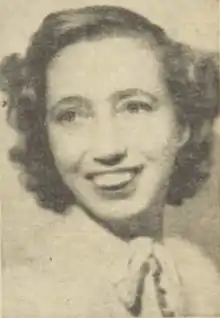Dora Birtles
Dora Birtles (née Toll; 1904[1]–1992), was an Australian novelist, short-story writer, poet and travel writer.[2]
Dora Birtles | |
|---|---|
 Dora Birtles, c.1946 | |
| Born | Dora Eileen Toll 2 April 1903 Wickham, New South Wales, Australia |
| Died | 28 January 1992 (aged 88) Cobar, New South Wales, Australia |
| Occupation | novelist, short-story writer, poet and travel writer |
| Education | University of Sydney |
| Partner | Bert Birtles |
| Children | 2 sons |
Life
Dora Toll was born in 1903 in Wickham, New South Wales, a suburb of Newcastle, the sixth daughter of Albert Frederick Toll and Hannah (née Roberts).[3] She was ahead of her time in studying at the University of Sydney in a period when few women received a tertiary education. However, she was suspended in 1923 for a poem appearing in the literary magazine Hermes, which describes post-coital bliss.[4] Her future husband, poet and journalist Bert Birtles, was expelled for a still more explicit poem in the same issue of Hermes describing their tryst on the roof of the university quadrangle.[5][6][7]
Dora Birtles returned to Sydney University to take a degree in Oriental history and a diploma of education,[3] and then taught in Newcastle, New South Wales for a short time before travelling to Europe. Before the Second World War she was a member of the International Women's League Against War and Fascism and reported for the Newcastle Sun.[8]

Birtles was the subject of a finalist portrait for the Archibald Prize of 1947, by Dora Toovey.[9]
Dora Birtles died in Cobar, New South Wales, on 28 January 1992 aged 88.[10]
Works
Birtles' first novel, Pioneer Shack was for children. It had been written in the 1930s but did not appear until 1947, after the publication of a novel for adults, The Overlanders (1946), which was based on the 1946 film of the same name for which she had been a researcher.[11][12] Birtles wrote an account of a sea voyage from Newcastle to Singapore, North-West by North (1935) which became one of her most popular works. She also wrote another children's novel, Bonza the Bull (1949). Her work has been the subject of feminist literary criticism.[13][14]
Bibliography
- North-West by North (1935)
- The Overlanders (1946)
- Australia in Colour (1947)
- Bonza the Bull (1949)
Works on Dora Birtles
- Moore, Deirdre (1996) Survivors of Beauty: memoirs of Dora and Bert Birtles (Croydon, NSW : Book Collectors' Society of Australia).
- Birtles, Bert (1938) Exiles in the Aegean (London: Victor Gollancz). Experiences in pre-war Greece.
References
- William Henry Wilde; Joy W. Hooton; B. G. Andrews (1985). The Oxford Companion to Australian Literature. Oxford University Press. p. 89. ISBN 978-0-19-554233-2.
- Spender, Dale (1988), Writing A New World: Two Centuries of Australian Women Writers, Sydney, Allen & Unwin, p. 301.
- The Feminist Companion to Literature in English, eds Virginia Blain, Patricia Clements and Isobel Grundy (London: Batsford, 1990), p. 95.
- Toll, Dora (1923). "Moon-Shadows". Hermes. 29: 16 – via University of Sydney Library Digital Collections.
- Barcan, Alan (2002) Radical Students: The Old Left at Sydney University, Melbourne University Press; Carlton South, pp. 27-28.
- Bert Birtles, Beauty, http://www.poemhunter.com/poem/beauty-432/
- Birtles, Bert (1923). "Beauty". Hermes. 29: 29 – via University of Sydney Library Digital Collections.
- Sage, Lorna. (1999), The Cambridge Guide to Women's Writing in English(New York; Cambridge University Press), p. 62.
- "Archibald Prize 1947 finalist: Dora Birtles by Dora Toovey". Art Gallery of New South Wales. Retrieved 5 May 2019.
- IMDb biography. Retrieved 4 May 2015.
- "Book inspired by film made here". Australian Women's Weekly (1933 - 1982). 17 August 1946. p. 28. Retrieved 5 May 2019.
- "Dora Birtles (1903–1992)". IMDb.
- Mills, Sara. (2003), Discourses of Difference: An Analysis of Women's Travel Writing and Colonialism, London; Taylor & Francis.
- Cooper, J. E. (1987). Shaping meaning: Women's diaries, journals, and letters—The old and the new. In Women's studies international forum (Vol. 10, No. 1, pp. 95-99). Pergamon.